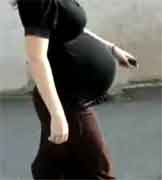- FDA Approves New Antibiotic Against UTIs
- New School Lunch Rules Target Added Sugars, Salt
- Dairy Cows Moved Across State Lines Must Now Be Tested for Bird Flu
- TikTok Riddled With Misleading Info on Health: Study
- Emulsifier Chemicals Are Everywhere in Foods. Could They Raise Diabetes Risk?
- Opioids During Pregnancy May Not Raise Psychiatric Risks for Offspring
- Could Heartburn Meds Raise Your Migraine Risk?
- Drug, Alcohol Abuse Goes Untreated in Many Ex-Prisoners
- Watchdog Group Says U.S. Food Recalls Rose Again Last Year
- Genes Could Mix With Pesticide Exposure to Raise Parkinson’s Risk
Expectant Mothers’ Lifestyle May Influence Child’s Later Weight


Children whose mothers had poor health habits during pregnancy are at increased risk for obesity, a new study suggests.
Researchers looked at more than 5,100 children in Greece and found that they were much more likely to be obese at age 8 if their mother gained more than the recommended amount of weight, did not exercise enough, or smoked during pregnancy.
On the positive side, the investigators also found that moderate exercise during pregnancy was linked to a reduced risk of childhood obesity.
Although the study found an association between a mother’s lifestyle habits and her child’s later weight, the study was not designed to prove whether or not an expectant mother’s behavior is a direct cause of a child’s excess weight.
The study was published online recently in the journal BMC Pregnancy and Childbirth.
“Pregnancy is a phase in a woman’s life in which she develops a greater awareness about her health and has an important opportunity to amend some unhealthy habits, like smoking and alcohol consumption, to adopt a more active lifestyle, and to participate in physical activities and/or exercise,” study author Labros Sidossis, a professor of internal medicine and surgery at the University of Texas Medical Branch at Galveston, said in a university news release.
“Health care professionals should advise expecting mothers to limit their pregnancy weight gain to the recommended range, not to smoke and consume alcohol, and to engage in moderate exercise during pregnancy,” Sidossis added.
Unfortunately, excess weight gain in pregnancy is common. Between 2004 and 2007, the Institute of Medicine said that more than half of pregnant women gained too much weight while expecting.
Pregnant women with no health problems or obstetric complications should get 150 minutes of moderate exercise a week, according to the American College of Sports Medicine and the American College of Obstetrics and Gynecology.
More information
The U.S. Office of Disease Prevention and Health Promotion explains how to have a healthy pregnancy.
Source: HealthDay
Copyright © 2024 HealthDay. All rights reserved.










